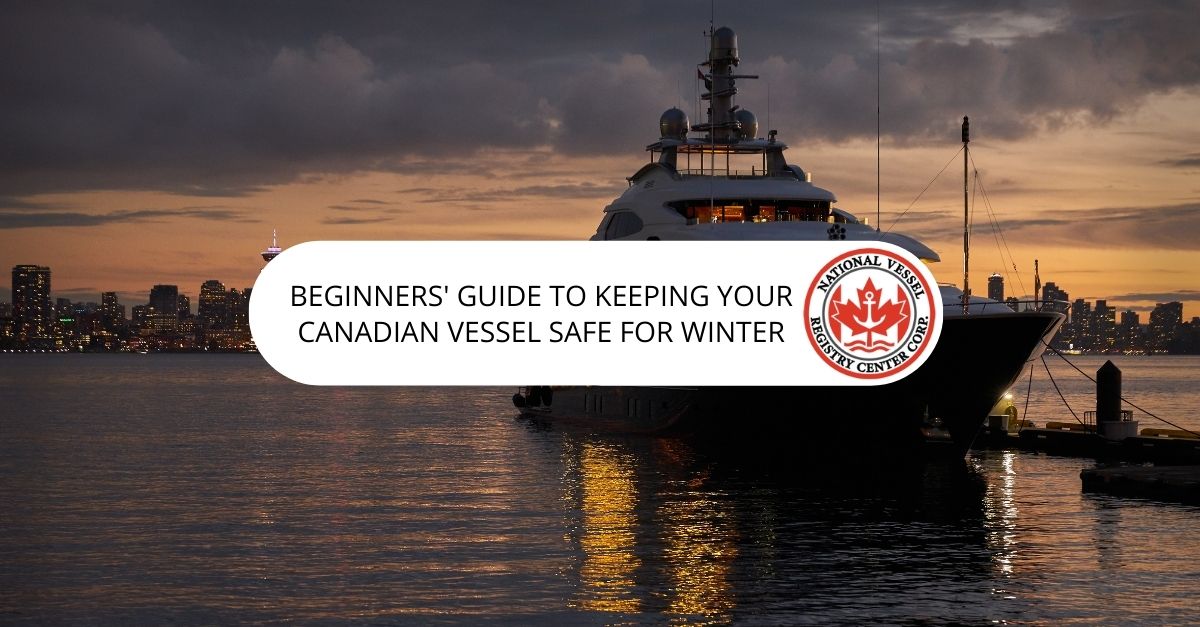If you’re a Canadian boater, you know how important it is to get your vessel ready for the winter. Boaters of all levels, from beginners to seasoned veterans, can profit from having a solid awareness of the requirements that winter places on a vessel. The time is near to make sure that your vessel is completely ready for storage during the winter months. At the Canadian Vessel Registry, we’d like to share some tips with you on boat precautions in Canada so that you can protect your vessel from suffering any long-term damage as well as everything you need to know about boat registration and the required forms.
Winterizing for Beginners
Winterizing one’s boat is an absolute necessity for the vast majority of boat owners unless they have a heated garage or storage facility available to them. If you are unable to do this, then you will need to take the necessary steps to winterize your boat before the onset of the cold season. The choice of how to winterize your boat will vary greatly depending on where in Canada you keep your boat. Keep reading for some of the most important information you’ll need to know in order to store your boat in an appropriate manner throughout the Canadian winter.
Why Do You Need to Store Your Boat?
If you enjoy boating in Canada, taking good care of your vessel will allow you to get even more pleasure out of being on the water in the long run. If you don’t take any preventative measures, winter can be rough on your boat and lead to significant damage that needs to be repaired. Among the many benefits of preparing your boat for winter is the fact that you help ensure that the boat and its machinery last for many years. Additionally, when properly winterizing your boat, you contribute to the environment by reducing the spread of other plants and animals when returning to sea.
How To Prepare Your Boat For The Winter Season In Canada
Purchasing a boat is an investment that should be treated as such and should receive routine maintenance. In the winter, when exposure to the outdoors is at its harshest, you need to take care to protect your belongings from being damaged by things like rust or mould. Just as it is important to take care of all boat registration responsibilities, it is also important to take good care of your investment. By reading the following tips, you will soon have peace of mind regarding the condition of your boat.
Fuel, Oil And Water Systems
In order to properly maintain your boat and prepare it for the winter, one of the most important steps is to check all of the fluids in it. Always remember to change the oil in the vehicle as well as flush and drain the cooling system. Also, check that the gear oil you’re using is appropriate for the task at hand.
Since you plan to put your boat away for an extended period of time, the last thing you want is for leaking batteries to sit for an extended period of time and cause even more harm to the boat. Therefore, it is important to do proper replacement of batteries and faulty changeable parts.
The hoses, pumps, and fish cages should all be drained and emptied. Pulling out the hull plug and putting the boat in a position with the bow up high is the final step that has to be completed, as well as lubricating the fittings so they don’t corrode or rust during the winter.
Determine Your Skill Level
How well you know your boat is directly proportional to the amount of time you’ve spent boating and the amount of participation you’ve had in boat upkeep. When it comes to putting your boat away for the winter, it is crucial that you have an accurate understanding of your current level of skill.
Even if you’ve been boating for years, it’s possible that you’re not familiar with the finer points of the fuel system on your boat. If you have never properly prepared your boat for the winter before, you are going to need a lot of additional assistance to understand how to do it.
Consider The Weather and Boat Characteristics When Planning Your Winterization
The procedures for winterizing a boat will differ depending on the kind of boat, its dimensions, and the kind of engine it has. If you have a basic understanding of your vessel, you will be better able to tailor an appropriate winterization plan for it. If you have any questions about your boat, you should always look at the owner’s manual.
Your Canadian winter may be mild, moderate, or harsh, depending on the region of the country in which you reside. But regardless of how cold it gets, if you get your boat ready for the winter so that it can be stored away, it will be in better form when the weather starts to get warmer again.
Obtain All Necessary Assistance And Permits.
Even though doing winterization work yourself can have its advantages, there are occasions when calling in an expert is the best course of action. The same thing applies when applying for your boat’s documentation. This is of the utmost significance if this is your very first time preparing your boat for the winter. It is possible that hiring an expert will be less expensive in the long run. Why? Poor winterization and improper vessel documentation can eventually cost you more in the long term. Explore our page at Canadian Vessel Registry. Find all the information and forms you might need.


